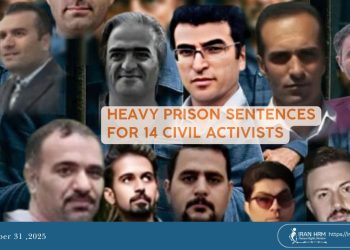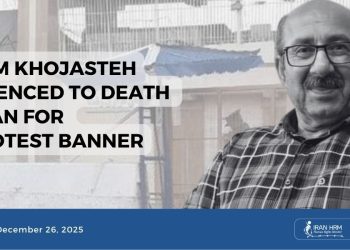Pouya Ghobadi Bistouni, a political prisoner and electrical engineer from Sonqor, has become a symbol of resistance against the Islamic Republic’s security crackdowns in recent years. Born in 1992, Ghobadi has been arrested and tortured multiple times due to his political and ideological activities and is now facing a death sentence.
Arrest and Torture in Evin Prison
His most recent arrest took place on December 22, 2023. Following his detention, he was immediately transferred to Ward 209 of Evin Prison—a notorious security ward—where he was subjected to torture and harsh interrogations. Afterward, he was moved to the general ward of Evin Prison, yet he remains under imminent threat.
Unfair Trial and Death Sentence
Pouya Ghobadi, along with seven other political prisoners, was tried in a joint case on October 6, 2024, in Branch 26 of Tehran’s Revolutionary Court, presided over by Judge Iman Afshari. The trial was conducted hastily and in blatant violation of the principles of fair legal process. Eventually, on November 30, 2024, he—along with five others: Vahid Bani-Amarian, Babak Alipour, Seyed Abolhassan Montazer, Seyed Mohammad Taghavi, and Ali Akbar Daneshvarkar—was sentenced to death and imprisonment.
The charges against Ghobadi include: “acting against national security through membership and effective collaboration with the People’s Mojahedin Organization of Iran (PMOI/MEK),” “propaganda against the regime,” “destruction of government property,” and “assembly and collusion against national security.” These charges, which are frequently repeated in political cases, are considered by human rights organizations to lack clear legal basis and credible evidence.
History of Repeated Arrests
Pouya Ghobadi’s political life had been under pressure prior to these recent developments. In May 2018, he was arrested for the first time by security forces and, after months of torture, was transferred to the general ward of Evin Prison. In November 2019, he was moved to the Greater Tehran Central Penitentiary. In December 2021, he was sentenced to 10 years in prison on the charge of “moharebeh” (waging war against God). His repeated arrests and convictions exemplify the security establishment’s harsh treatment of political and ideological dissidents in Iran.







